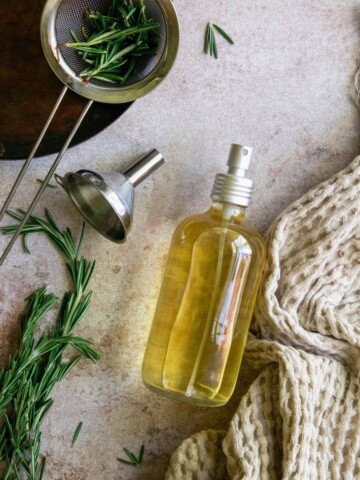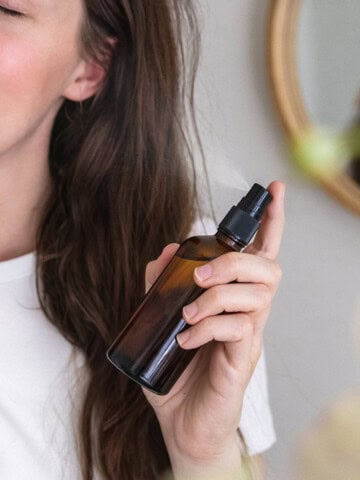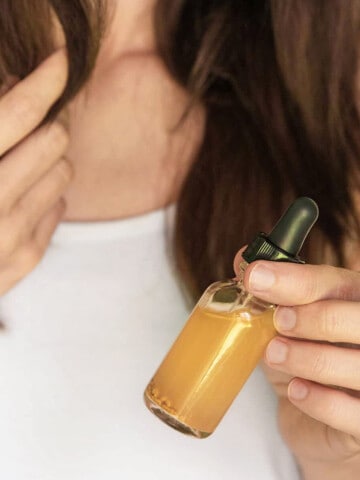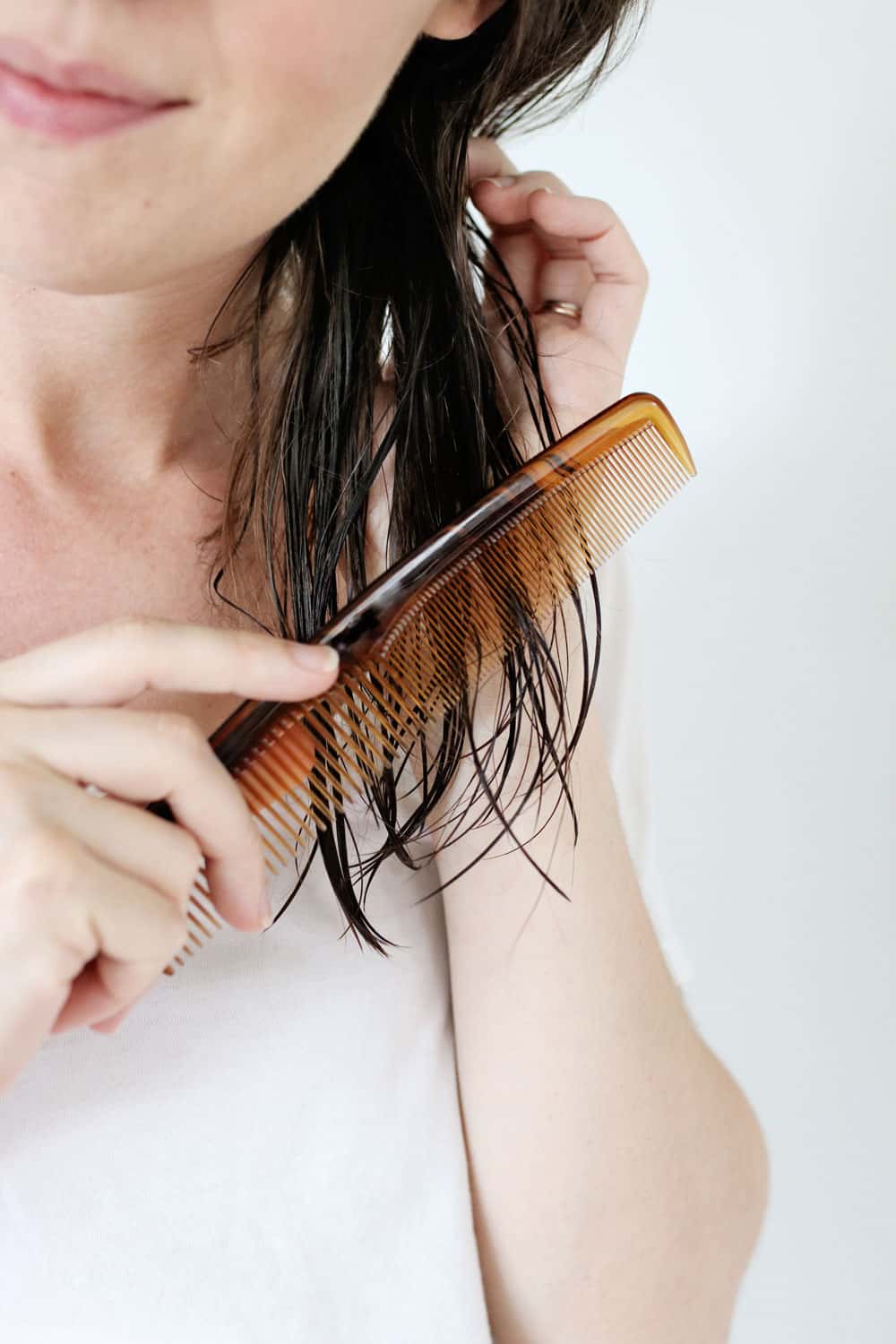If you're making the switch to natural haircare ingredients, don't forget about essential oils. Whether you're looking to nix dandruff or stimulate hair growth, using essential oils for hair can actually make your strands stronger and healthier.
And there are so many good essential oils for hair, no matter what your hair type is. Oily hair? Dry hair? Yep, there's an oil for that.
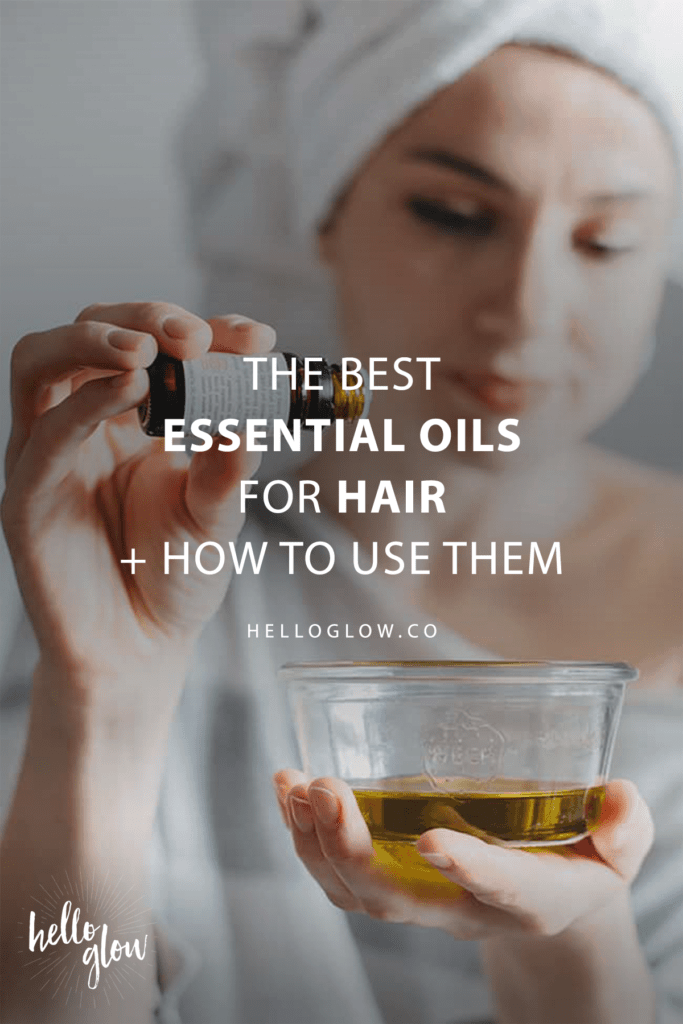
Jump to:
How to Use Essential Oils for Hair
Pick an oil that works for your hair needs, then try one of these simple ways to apply it. If you make your own shampoo or hair spray, you can easily customize the recipe with essential oils to improve your locks. (Bonus: your hair will smell good, too!)
If you're not into DIY, you can add essential oils to your favorite natural hair products. Just don't apply essential oils directly onto your scalp, as this can cause burning, redness, or irritation. Always dilute first!
Essential Oils for Dry Hair
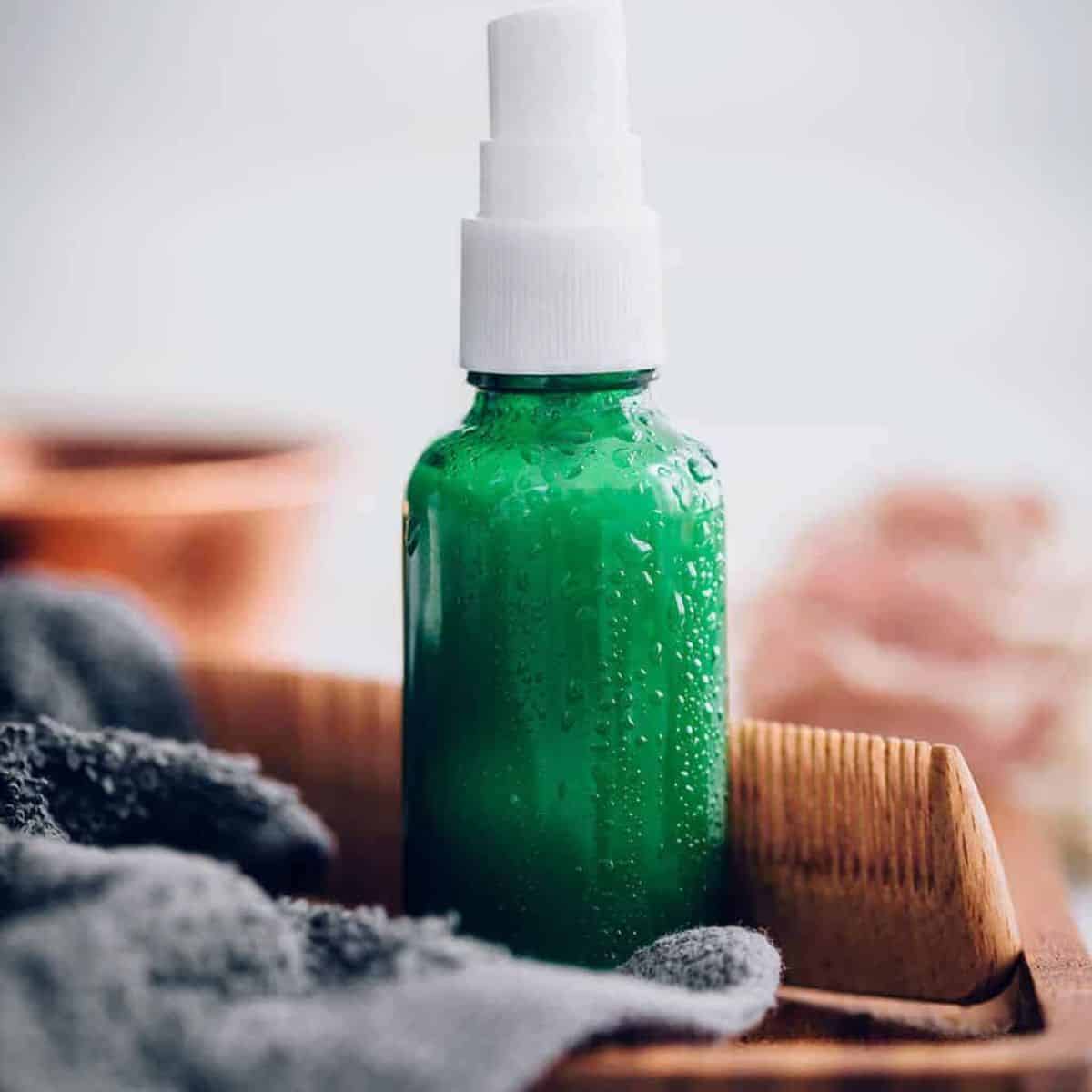
Essential oils are the perfect ally for restoring moisture, adding shine, and rejuvenating your locks. Applied to the hair via a nourishing carrier oil, essential oils help seal moisture into damaged hair.
Lavender has been shown to promote hair growth [source] and to have anti-inflammatory activity [source] in animal studies. By addressing inflammation, using this oil will improve the scalp environment, leading to healthier, more manageable strands.
Geranium is especially helpful for dry hair. Like lavender, geranium nourishes and naturally conditions hair while helping to balance oil production by the scalp.
Sandalwood is a luxurious oil known for its moisturizing properties that can help nourish and hydrate dry hair, leaving it soft and manageable.
Ylang-ylang can help balance the scalp's natural oils. It promotes healthier hair growth and adds a beautiful floral fragrance to your hair.
Clary sage is known for its hydrating properties, making it an excellent choice for dry hair. It helps condition and nourish the hair follicles, reducing dryness and frizz.
Patchouli is rich in antioxidants [source] that work to improve hair texture and hydration. It helps seal in moisture, preventing further dryness and promoting healthier-looking hair.
Dry Hair EO Recipes
Nourishing Hair Mask: Create a homemade hair mask by mixing a few drops of lavender essential oil, argan oil, and honey. Apply the mixture to your hair, and leave it on for 30 minutes before rinsing. This deep conditioning treatment helps restore moisture and improve hair elasticity.
Overnight Oil Treatment: Before bed, mix a scalp oil with a few drops of clary sage essential oil. Massage the mixture into your scalp and through your hair. Cover with a shower cap and wash it out in the morning for hydrated and revitalized locks.
Leave-In Conditioner: Mix a few drops of geranium or sandalwood essential oil with a water-based leave-in conditioner. Apply it to the mid-lengths and ends of your hair for extra moisture and a silky-smooth finish.
Scalp Massage: Combine a few drops of clary sage essential oil with jojoba oil and massage it into your scalp. This soothing and moisturizing treatment helps relieve dryness and also nourishes the scalp.
Refreshing Hair Mist: Fill a spray bottle with water, and add a few drops of ylang-ylang or patchouli essential oil. Spritz it onto your dry hair throughout the day to revive and hydrate your locks.
Essential Oils for Oily Hair
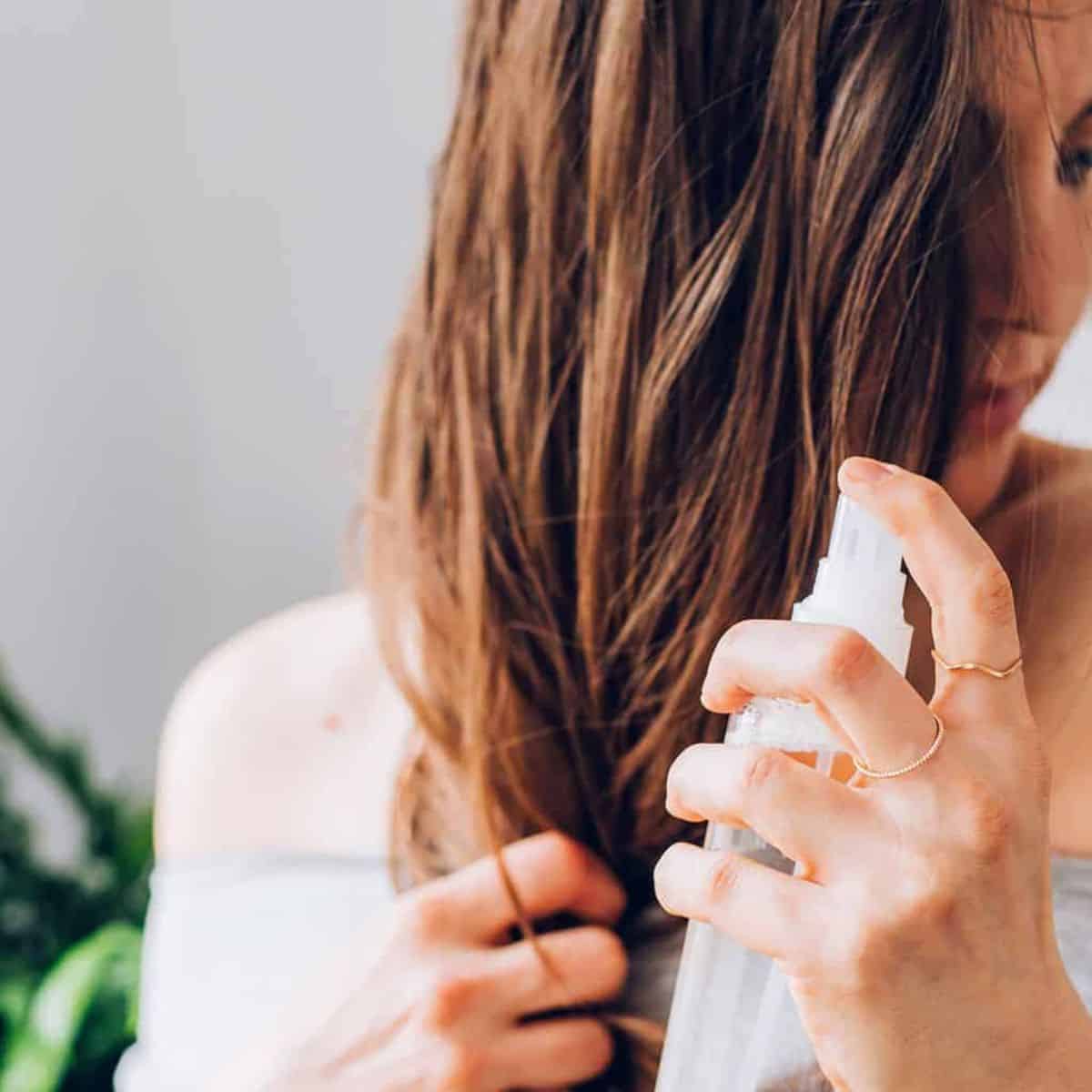
If your hair is oily, you may need to “train” it by shampooing less often. Pick one of these oils (no, they won't make your hair greasy) that can cut through grease and also help your scalp balance its oil production.
Lemon is a natural astringent that can help regulate oil production and provide a refreshing citrus scent to your hair.
Geranium has balancing effect on the scalp's natural oil production. By controlling excess oil, it can reduce greasiness to help maintain a more balanced scalp environment.
Juniper berry has detoxifying and astringent properties. It can help cleanse the scalp by removing impurities and excess oil, making it beneficial for oily hair.
Cypress has astringent properties that can help balance oiliness and reduce excess oil buildup.
Cedarwood is known for its balancing and purifying properties. It helps normalize the scalp's sebum production, minimizing greasiness and promoting a healthier scalp microbiome.
Oily Hair EO Recipes
Pre-Shampoo Scalp Treatment: Mix a few drops of tea tree essential oil with a carrier like jojoba oil, and massage it into your scalp before shampooing. This helps control excess oil and promotes a balanced scalp.
DIY Dry Shampoo: Create a homemade dry shampoo by combining arrowroot powder with a few drops of lavender or lemon essential oil. Apply it to your roots to absorb excess oil and refresh your hair between washes.
Leave-In Conditioner: Add a few drops of geranium or ylang-ylang essential oil to your regular conditioner, and apply it to the ends of your hair. This provides lightweight hydration without weighing down your hair.
Refreshing Hair Mist: Fill a spray bottle with water and add a few drops of cypress or rosemary essential oil. Spritz it onto your roots to refresh your hair and control oiliness throughout the day. A salt spray is an excellent way to deliver essential oils to the hair and also absorb excess oil. Spritz the roots of your hair before or after styling.
Overnight Scalp Treatment: Mix a small amount of diluted lavender or cedarwood essential oil with a carrier oil, and massage it into your scalp before bed. Cover your hair with a shower cap overnight for a nourishing and balancing treatment.
Essential Oils for Hair Growth
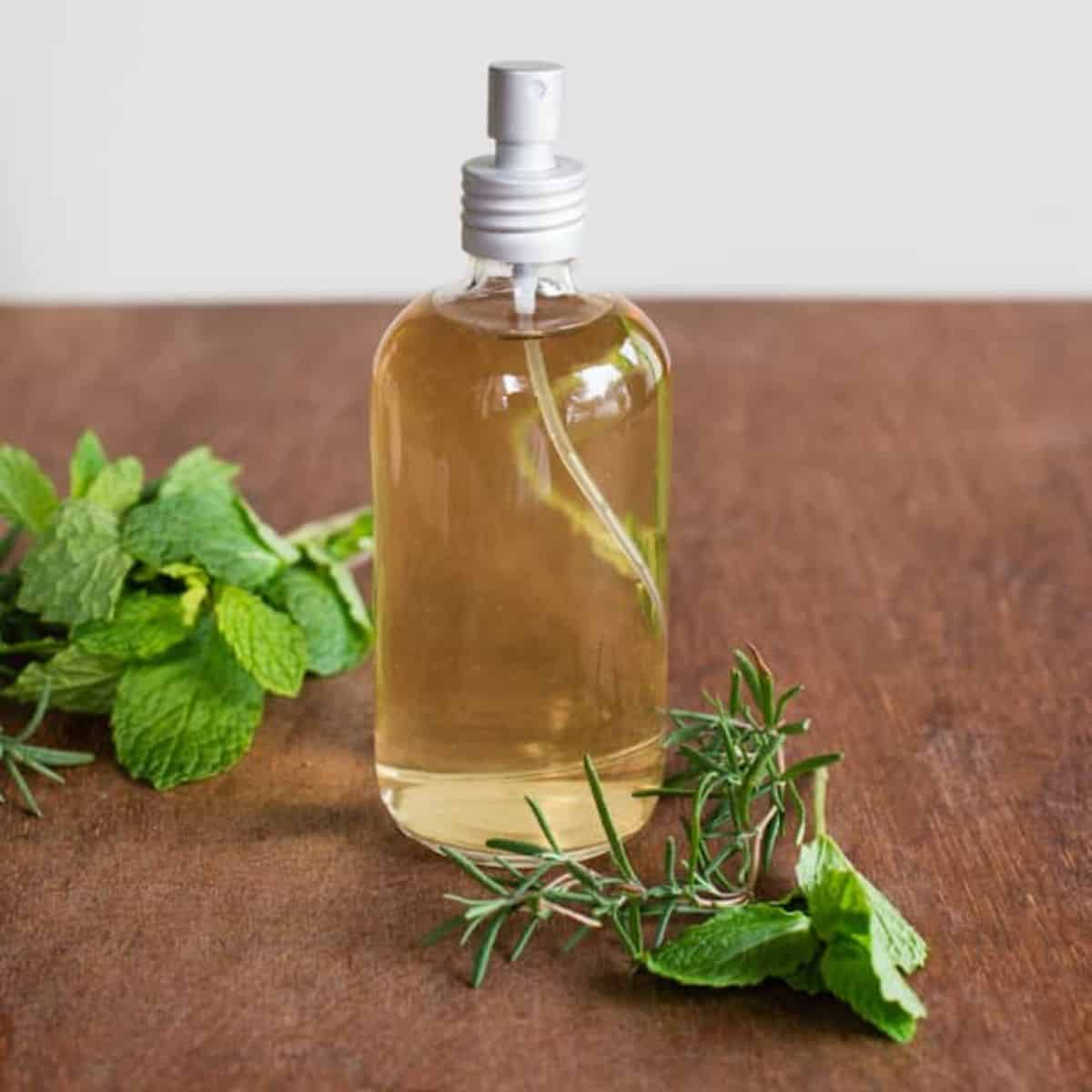
Essential oils are frequently used for stimulating the scalp in cases of hair loss. They can provide increased circulation to the area as well as moisture and nourishment for the follicles.
Rosemary is the most well-known oil for stimulating hair growth and improving scalp health. Its active compounds help strengthen hair follicles and reduce hair loss, leading to healthier and longer hair. When used for 6 months, rosemary essential oil was shown to work as well as one conventional topical hair loss treatment [source].
Peppermint is known for its cooling and invigorating effects on the scalp and has also been proven to promote hair growth [source].
Cypress oil increases collagen production in the scalp around the follicles, which seems to be its mechanism for slowing down hair loss [source].
Hair Growth EO Recipes
Shampoo upgrade: Add 10 drops of rosemary essential oil and 5 drops of peppermint essential oil (or 15 drops of any combination of the other oils of your choice) to an 8-ounce shampoo or conditioner bottle and shake to combine. Massage into your scalp each time you wash your hair.
Hair Growth Serum: Use this rosemary hair serum for a weekly scalp-stimulating massage. Apply to the roots of your hair and press firmly into the scalp with your fingertips. Leave it on your hair overnight, and wash it out in the morning.
Scalp Massage: Combine a few drops of peppermint essential oil with a carrier like jojoba or coconut oil. Massage the mixture into your scalp for a few minutes to stimulate blood circulation and promote hair growth.
DIY Hot Oil Treatment: Heat a mixture of rosemary and lavender essential oils and olive oil. Apply it to your scalp and hair, covering with a shower cap for 30 minutes. The heat helps the oils penetrate the hair follicles, nourishing and promoting growth.
Essential Oil Rinse: After shampooing, mix a few drops of lemon and tea tree essential oils and water. Use this mixture as a final hair rinse to cleanse the scalp, remove buildup, and promote a healthy environment for new hair growth.
Overnight Hair Mask: Combine a few drops of lavender essential oil, rosehip seed oil, and castor oil. Apply the mixture to your hair, focusing on the roots and ends. Leave it on overnight, and wash it out in the morning for deeply nourished hair follicles.
Essential Oils for Dandruff
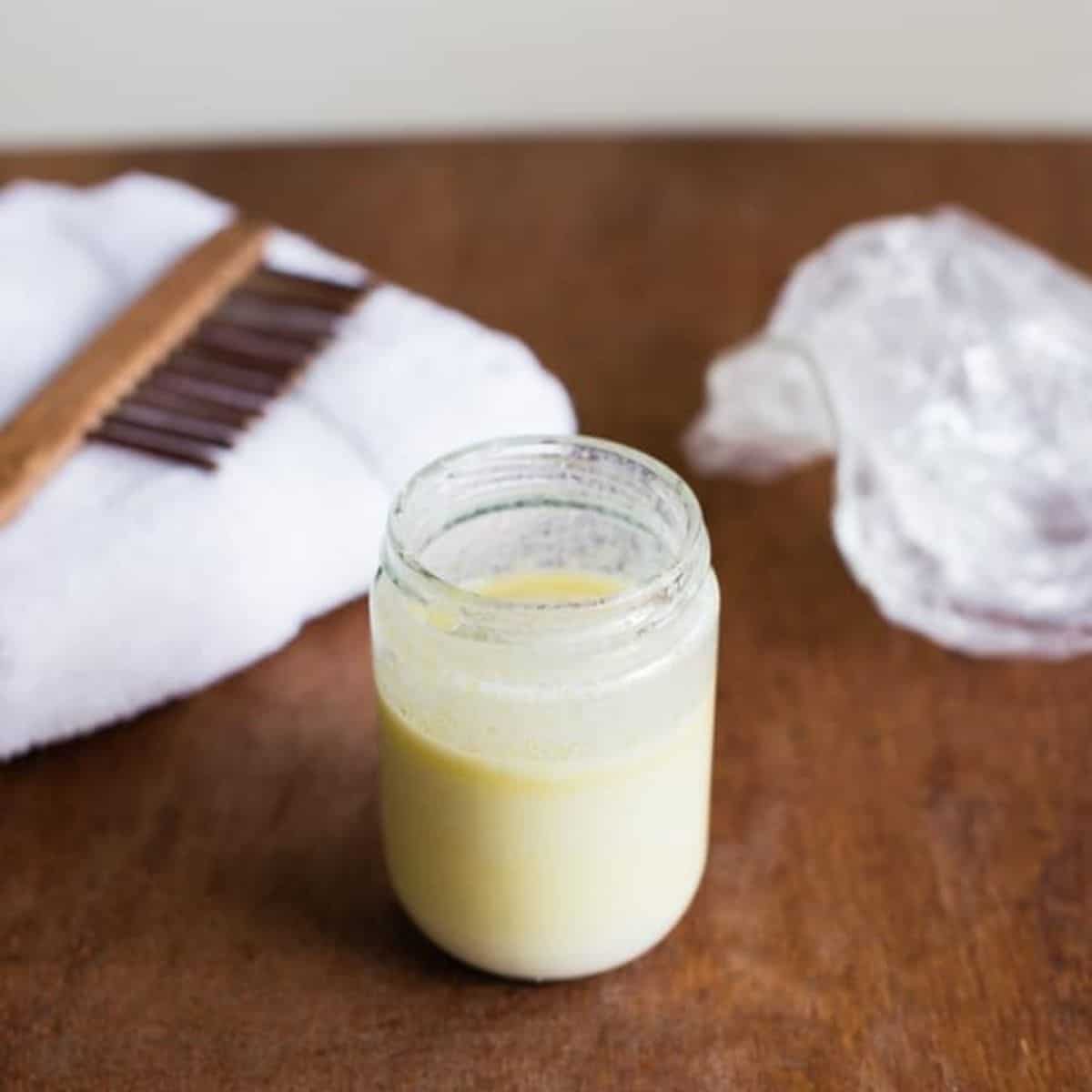
Many essential oils are naturally antifungal, so why not put their flake-fighting power to use? Discover their natural wonders to effectively combat dandruff and enjoy a healthier, dandruff-free scalp.
Tea tree is well known for its antifungal properties [source] that can help combat the underlying causes of dandruff, such as yeast overgrowth.
Rosemary also has soothing anti-inflammatory and antimicrobial phytocompounds [source] that may help alleviate dandruff.
Lemongrass is especially effective if the dandruff is a result of yeast overgrowth [source]. And in one study, lemongrass oil was shown to be effective for treating dandruff [source].
Peppermint not only has potent anti-inflammatory activity [source], but it also imparts a cooling sensation that can provide relief from itchiness and irritation associated with dandruff.
Lavender has been shown to reduce the effects of inflammation [source] with its calming properties that can help soothe an irritated scalp and reduce dandruff symptoms.
Dandruff EO Recipes
Pre-Shampoo Scalp Treatment: Combine a few drops of tea tree and lemongrass essential oils and a carrier oil. Massage the mixture into your scalp before shampooing to target dandruff-causing bacteria and soothe irritation.
DIY Dandruff Shampoo: Add a few drops of rosemary or eucalyptus essential oil to your regular sulfate-free shampoo. These essential oils have antimicrobial effects that can help control dandruff and promote a healthier scalp.
Overnight Hair Mask: Mix a few drops of lavender essential oil, coconut oil, and aloe vera gel. Apply the mask to your scalp and hair before bedtime, leaving it on overnight. This nourishing blend helps hydrate the scalp and reduce dandruff flakes.
Scalp Tonic: Create a blend of peppermint essential oil, jojoba oil, and apple cider vinegar. Apply it to your scalp using a cotton pad, focusing on areas with dandruff. This tonic helps balance the scalp's pH and reduce flakiness.
Refreshing Hair Mist: Fill a spray bottle with water and add a few drops of tea tree essential oil and alcohol-free witch hazel. Spritz this mixture onto your scalp and hair throughout the day to maintain freshness and keep dandruff at bay.
Essential Oils for Dry + Itchy Scalps
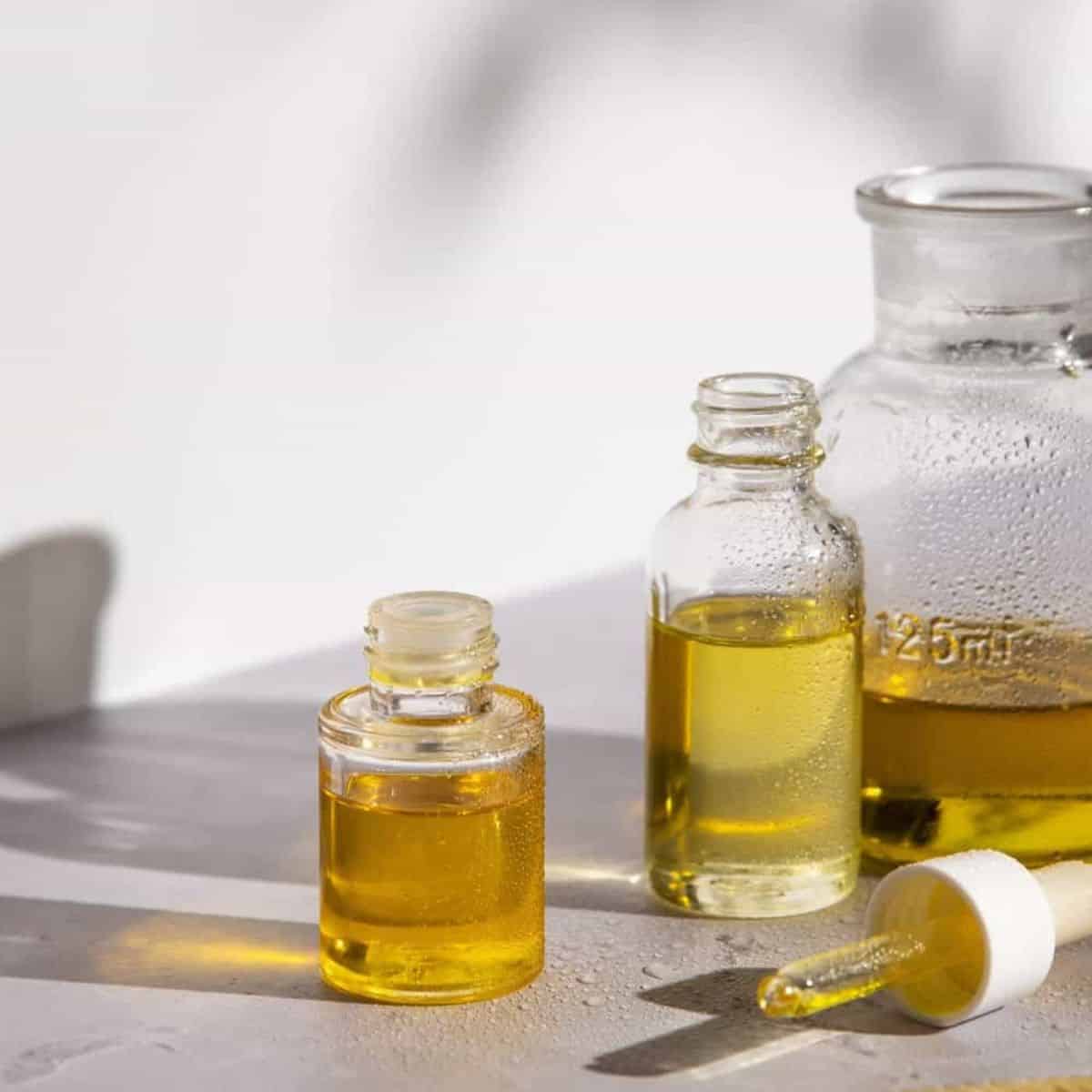
Essential oils help soothe irritated skin, so why not use them on itchy scalps? These oils are naturally anti-inflammatory to help relieve symptoms and improve healing in dry scalps.
The big three oils—lavender, tea tree, and peppermint—can soothe inflammation and provide relief for your dry, itchy scalp. But here are a few more oils to consider using:
Chamomile has been shown to be effective in treating eczema [source]. Its calming properties can soothe inflammation and relieve itchiness in a dry scalp.
Helichrysum is prized for its anti-inflammatory healing and soothing effects [source], making it beneficial for dry, itchy scalps.
Dry, Itchy Scalp EO Recipes
Scalp scrub: Add a few drops of tea tree essential oil to this anti-inflammatory apple cider vinegar scalp scrub. Then gently massage the scrub onto your scalp to exfoliate and remove dry skin, relieving itchiness. If your scalp is tender, you might want to replace the pink salt with a finer-grain salt or skip it altogether.
Hair Mask: Add a couple of drops of chamomile or lavender essential oils to a honey hair mask to speed scalp healing.
Overnight Scalp Treatment: Combine a few drops of helichrysum essential oil, jojoba oil, and vitamin E oil. Massage the mixture into your scalp before bed and leave it on overnight. Wake up to a nourished scalp and reduced itchiness.
Soothing Hair Rinse: After shampooing, prepare a hair rinse using apple cider vinegar, rosemary essential oil, and water. Rinse your hair with this mixture to soothe your scalp and balance its pH levels, reducing dryness and itchiness.
Leave-In Conditioner: Add a few drops of chamomile essential oil to your favorite leave-in conditioner. Apply it to your hair, focusing on the scalp, to moisturize and calm irritation throughout the day.
Cooling Hair Mist: Fill a spray bottle with water and add a few drops of peppermint essential oil and aloe vera gel. Spritz the mixture onto your scalp whenever needed for a refreshing and cooling sensation that alleviates dryness and itching.
References
1. Lee BH, et al. Hair growth-promoting effects of lavender oil in C57BL/6 mice. Tox Res. 2016.
2. Da Silva GL, et al. Antioxidant, analgesic and anti-inflammatory effects of lavender essential oil. An Acad Bras Cienc. 2015.
3. Swamy MK, et al. A comprehensive review on the phytochemical constituents and pharmacological activities of Pogostemon cablin Benth.: an aromatic medicinal plant of industrial importance. Molecules. 2015.
4. Panahi Y, et al. Rosemary oil vs minoxidil 2% for the treatment of androgenetic alopecia: a randomized comparative trial. Skinmed. 2015.
5. Oh JY, et al. Peppermint oil promotes hair growth without toxic signs. Toxicol Res. 2014.
6. Park YO, et al. Action mechanism of Chamaecyparis obtusa oil on hair growth. Toxicol Res. 2013.
7. Wroblewska M, et al. The influence of tea tree oil on antifungal activity and pharmaceutical characteristics of Pluronic® F-127 gel formulations with ketoconazole. Int J Mol Sci. 2021.
8. Rafael de Oliveira J, et al. Rosmarinus officinalis L. (rosemary) as therapeutic and prophylactic agent. J Biomed Sci. 2019.
9. Wuthi-Udomlert M, et al. Inhibitory effect of formulated lemongrass shampoo on Malassezia furfur: a yeast associated with dandruff. Southeast Asian J Trop Med Public Health. 2011.
10. Chaisripipat W, et al. Anti-dandruff hair tonic containing lemongrass (Cymbopogon flexuosus) oil. Forsch Komplementmed. 2015.
11. Zhao H, et al. Peppermint essential oil: its phytochemistry, biological activity, pharmacological effect and application. Biomed Pharmacother. 2022.
12. Esteves Cardia GF, et al. Effect of lavender (Lavandula angustifolia) essential oil on acute inflammatory response. Evid Based Complementary Altern Med. 2018.
13. Srivastava JK, et al. Chamomile: a herbal medicine of the past with bright future. Mol Med Report. 2010.
14. Furlan V, et al. Helichrysum italicum: from extraction, distillation, and encapsulation techniques to beneficial health effects. Foods. 2023.
This post was medically reviewed by Dr. Holly Smith, a board-certified physician in nephrology and internal medicine with a background in nutrition. Learn more about Hello Glow's medical reviewers here. As always, this is not personal medical advice, and we recommend that you talk with your doctor.
854
